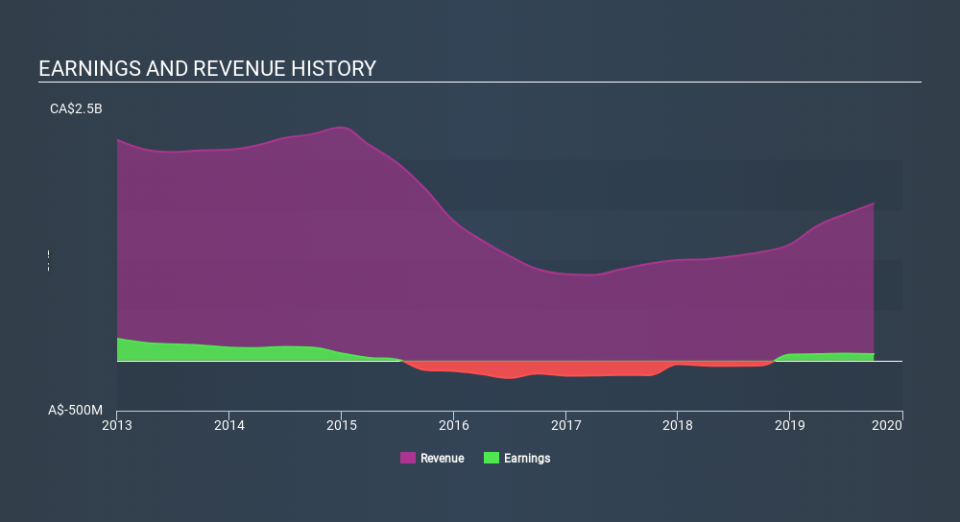Some Ensign Energy Services (TSE:ESI) Shareholders Have Taken A Painful 74% Share Price Drop

Generally speaking long term investing is the way to go. But unfortunately, some companies simply don't succeed. Zooming in on an example, the Ensign Energy Services Inc. (TSE:ESI) share price dropped 74% in the last half decade. That's not a lot of fun for true believers. And we doubt long term believers are the only worried holders, since the stock price has declined 47% over the last twelve months. Shareholders have had an even rougher run lately, with the share price down 21% in the last 90 days. This could be related to the recent financial results - you can catch up on the most recent data by reading our company report.
Check out our latest analysis for Ensign Energy Services
To quote Buffett, 'Ships will sail around the world but the Flat Earth Society will flourish. There will continue to be wide discrepancies between price and value in the marketplace...' One imperfect but simple way to consider how the market perception of a company has shifted is to compare the change in the earnings per share (EPS) with the share price movement.
During five years of share price growth, Ensign Energy Services moved from a loss to profitability. Most would consider that to be a good thing, so it's counter-intuitive to see the share price declining. Other metrics may better explain the share price move.
We note that the dividend has remained healthy, so that wouldn't really explain the share price drop. However, revenue has declined at a compound annual rate of 13% per year. With dividends up, but revenue down, some investors might be concluding that the company is no longer growing.
The graphic below depicts how earnings and revenue have changed over time (unveil the exact values by clicking on the image).
We consider it positive that insiders have made significant purchases in the last year. Having said that, most people consider earnings and revenue growth trends to be a more meaningful guide to the business. So we recommend checking out this free report showing consensus forecasts
What About Dividends?
As well as measuring the share price return, investors should also consider the total shareholder return (TSR). Whereas the share price return only reflects the change in the share price, the TSR includes the value of dividends (assuming they were reinvested) and the benefit of any discounted capital raising or spin-off. So for companies that pay a generous dividend, the TSR is often a lot higher than the share price return. As it happens, Ensign Energy Services's TSR for the last 5 years was -63%, which exceeds the share price return mentioned earlier. This is largely a result of its dividend payments!
A Different Perspective
Ensign Energy Services shareholders are down 41% for the year (even including dividends) , but the market itself is up 12%. However, keep in mind that even the best stocks will sometimes underperform the market over a twelve month period. Regrettably, last year's performance caps off a bad run, with the shareholders facing a total loss of 18% per year over five years. Generally speaking long term share price weakness can be a bad sign, though contrarian investors might want to research the stock in hope of a turnaround. It is all well and good that insiders have been buying shares, but we suggest you check here to see what price insiders were buying at.
Ensign Energy Services is not the only stock insiders are buying. So take a peek at this free list of growing companies with insider buying.
Please note, the market returns quoted in this article reflect the market weighted average returns of stocks that currently trade on CA exchanges.
If you spot an error that warrants correction, please contact the editor at editorial-team@simplywallst.com. This article by Simply Wall St is general in nature. It does not constitute a recommendation to buy or sell any stock, and does not take account of your objectives, or your financial situation. Simply Wall St has no position in the stocks mentioned.
We aim to bring you long-term focused research analysis driven by fundamental data. Note that our analysis may not factor in the latest price-sensitive company announcements or qualitative material. Thank you for reading.


